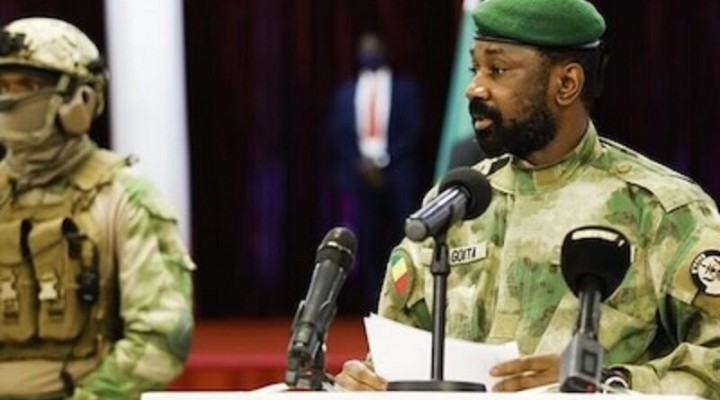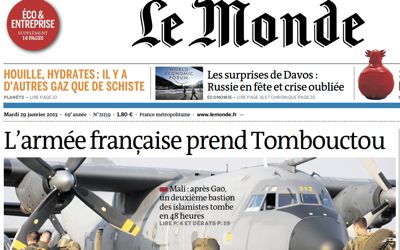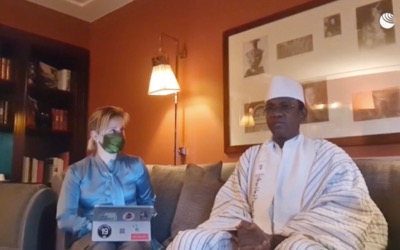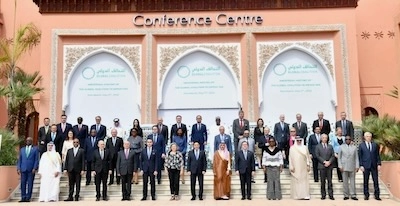Mali faced with French contradictions

After nine years of presence in Mali, the French army retired proud of the work accomplished. They indeed bravely fought the jihadists. But this assessment hides the reality. Mali’s current difficulties stem largely from NATO’s illegal intervention in Libya. As for the development of jihadist groups, it is organized… by the French secret services. Like the United States in the Middle East, the French are both firefighters and arsonists in Mali. Admittedly, they are withdrawing their army, but at the same time, they are preparing with Washington a larger war in the Sahel.
In 2010, during the Ivorian crisis, France changed its policy in Africa. The support given by President Nicolas Sarkozy to the candidate Alassane Ouattara served neither the interests of the Ivory Coast, nor those of the large French companies, which tried in vain to oppose it. Paris was asked by Washington to bring down President Laurent Gbagbo, a former CIA collaborator turned nationalist.
This phenomenon was amplified the following year in Libya. President Sarkozy may have thought he could carve out an oil empire by overthrowing a regime, but in fact he served neither Libyan nor French interests. He aligned himself with the United States and NATO.
However, Muamar Gaddafi was the only person in Africa who had managed to get Arabs and blacks to work together, after centuries of war and slavery. In addition, he had used oil revenues to try, with President Amadou Toumani Touré, to build a minimal state in Mali (formerly “French Sudan”), on the model of the French socialists of the 19th century (Proudhon, Fourier) and of the Libyan Arab Jamahiriya.
By overthrowing the Leader of the Libyan Revolution, NATO inevitably caused chaos in Mali. By relying on the jihadists of Al-Qaeda against Libya, the United States provoked the revolt of the commander of AfriCom, then the reversal of NATO’s objectives.
In the months that followed the Tuareg rebellion resumed, but now jihadist groups, supported by the Libyan Muslim Brotherhood (that is to say by the Anglo-Saxon secret services), played a much more important role. The soldiers of Bamako, who had only derisory means to confront them, mutinied. The French and American secret services took advantage of this to overthrow him a few weeks before the end of his mandate and to replace him with the President of the National Assembly, Dioncounda Traoré. This sleight of hand was legalized by ECOWAS (Economic Community of West African States), whose president was none other than Alassane Ouattara, put in power a year earlier by the French army. in Ivory Coast.
The jihadists then attacked Konna and extended Sharia to the north of the country. The pseudo-president Dioncounda Traoré called for help from the French army, which was waiting for his signal. French President François Hollande naturally offered his assistance in order to counter the influence of the jihadists (supported by his Anglo-Saxon and Qatari allies) and to secure his uranium supply. This was Operation Serval, approved by the United Nations Security Council. This was clearly a return to the old colonial policy. In 2014, a secret agreement was reached which allowed Paris to deploy its men, no longer in Mali and Chad alone, but throughout the Sahel, no longer against the Anglo-Saxons, but with them and all the Europeans against the jihadists (although still supported by them). This was Operation Barkhane.
After a period of confusion, elections were finally held which legally placed President Ibrahim Boubacar Keïta in power. The latter, while claiming to be secular, relied on Saudi Arabia (which had turned against the Muslim Brotherhood) against Qatar (which now supported the Brotherhood)

The French contradictions were already glaring: President Hollande had been forced to interrupt the deployment of Operation Serval, while his Qatari allies withdrew their military advisers from the jihadists. Then, the Syrian jihadists, supported by France, demonstrated against the “French traitors” who were fighting their “brothers” in Mali. Russian Foreign Minister Sergei Lavrov questioned his French counterpart about this mic-mac. But with aplomb, Laurent Fabius replied, laughing: “It’s our realpolitik ” ( sic !).
The first actions of the French army were militarily unacceptable: the civilian victims of the bombardments were seven times more numerous than the jihadists killed. There followed a reversal of Malian opinion against France.
The first victim of this stupid and barbaric policy was President Ibrahim Boubacar Keïta, overthrown by a new military junta in 2020. A new period of trouble began insofar as this junta was not homogeneous. Ultimately, the military claiming the example of the Burkinabe revolutionary Thomas Sankara (1949-83) formed a transitional government around Colonel Assimi Goïta.

The Malian army was not long in discovering the pot-aux-roses. On October 8, 2021, the then Prime Minister, Choguel Kokalla Maïga, during an interview with RIA-Novosti, accused France of double-dealing. He even gave details of the training of jihadists in Kigal, whose entry was forbidden by the French army to Malian officials. Of course, no French media, apart from the Voltaire Network , reported on this interview.
The Western press, on the contrary, reported on negotiations with Russia that could lead to the deployment of the private military company Wagner.
On December 23, 2021, France sent Mali a note co-signed by Belgium, the United Kingdom, the Netherlands, Denmark, Germany, Italy, Canada, Lithuania, Norway, Portugal, Romania, the Czech Republic and Sweden, deploring the possible recourse to the Wagner Group which would not fail to burden the country’s budget.
In January 2022, the transitional government (the “junta” in French terminology) denounced a violation of its airspace by its French hosts. Immediately General Laurent Michon, who commands the Barkhane force, protests his good faith. He asserts the privileges granted to France by the puppet president Dioncounda Traoré during the installation of Serval and pretends to believe that they are valid for Barkhane.
It is clear that the efforts of the French military, independently of the contrary role of the French secret services, is a failure recognized by all observers. Unable to distinguish the good guys from the bad guys, the transitional government asked the French to leave. Paris is trying to exert pressure via ECOWAS. Its members decide to close their borders with Mali and to freeze its assets at the Central Bank of West African States. But nothing helps, the French begin to pack up.

On May 11, the United States organized a meeting of the Global Coalition against Daesh in Morocco. 85 States participated at the level of their Ministers of Foreign Affairs, under the chairmanship of the Straussian Victoria Nuland. It was about preparing for the next war in the Sahel with the weapons offered in Ukraine, but stored in Kosovo and Albania.
In mid-June 2022, when the French began to withdraw, the transitional government hired a private Russian military company, the Wagner group, to replace them. A campaign against these intruders and one of their leaders, Evgueni Prigojine, began a month ago in France. The publisher Michel Lafon publishes the testimony of one of his former commanders on his deployment in Donbass and Syria. The group is also present in the Central African Republic and in Libya. Wagner is accused of various abuses, moreover less important than those committed by French soldiers. Prigojine is accused of owning a computer company and manipulating the US presidential election. This intoxication is repeated at length even though the US judicial inquiry into this subject has never managed to establish anything.
On July 3, ECOWAS, fearing to alienate Russia, discreetly canceled its sanctions.
The transitional government sends to the Security Council, on July 6, a precise calendar of the political reforms planned until the election of the President of the Republic, in February 2024. It was obviously prepared with Russian advisers.
On July 21, 2022, the general commanding the Barkhane force accused the Wagner group of exploiting three gold mines as payment for its intervention, which in his eyes constituted “hard hitting predation”.
On August 9, the Russian Federation hands over a large batch of planes and helicopters to the Malian army.
On August 16, Mali seized the Security Council, asking for a special meeting on France’s support for the jihadists. In his letter, he claims to have proof of the French double game.
The same day, France sent the Council a press release on the withdrawal of the Barkahne force from Mali. President Emmanuel Macron, evading the responsibility of his country in the crushing of Libya and in supporting the jihadists, welcomes the work accomplished over nine years. He recalls that 59 French soldiers sacrificed their lives for the safety of the European and Malian populations.
Several questions arise:
Pourquoi l’armée française a-t-elle d’aussi piètres résultats en Afrique ? Par contraste, le bilan du Groupe Wagner en Centrafrique, où il est présent depuis 2018, apparaît positif. Certes, ses soldats ont commis des exactions (plutôt moins que leurs homologues français), mais ils sont parvenus à rétablir la paix. Au combat, l’armée française n’a plus les moyens de ses ambitions. Elle ne parvient pas à vaincre des groupes jihadistes et, selon l’Assemblée nationale à Paris, serait balayée en moins de deux jours si elle devait livrer une guerre de haute intensité
Why does the French army agree to fight jihadists supported by France? In practice, there has been no French foreign policy since 2007, but a series of blows according to the opportunities. These thoughtless actions have repercussions in mainland France where the jihadists no longer hesitate to pursue them. The Muslim Brotherhood, which seemed to be a formidable secret weapon during the Cold War, is today the enemy within.
Why did the French leaders resume, in 2011, the colonial policy of the 19th century, even though the French people have never ceased to condemn it?
 TheAltWorld
TheAltWorld 
0 thoughts on “Mali faced with French contradictions”